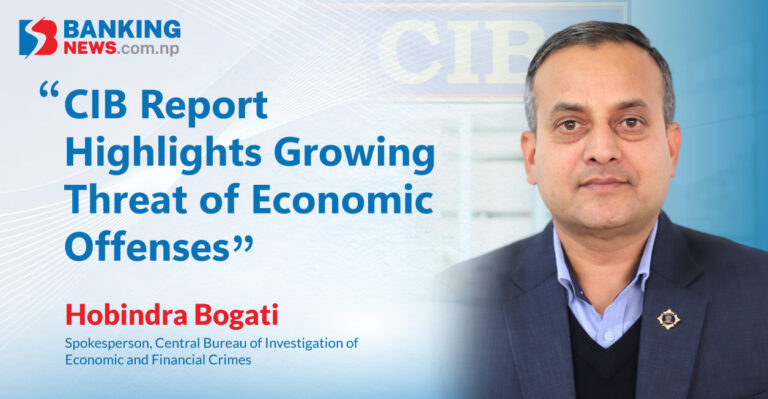Banking News – Economic and financial crimes non-violent, profit-driven illegal acts are rapidly evolving in Nepal, posing serious threats to national integrity, economic stability, and public trust in the financial system. According to experts, these crimes, often referred to as “white-collar crimes,” now account for nearly 90% of reported offenses, a drastic reversal from past trends.
Nature and Rise of Economic Crimes
Following the global wave of digitization and financial liberalization, Nepal has witnessed an alarming increase in sophisticated financial crimes. These include:
- Cooperative fraud
- Banking offenses
- Insurance fraud
- VOIP (illegal call bypass) operations
- Money laundering
- Customs and tax evasion
- Black market currency operations
- Cryptocurrency scams
- ATM and digital payment frauds
The growth of such crimes has prompted Nepal’s Central Investigation Bureau (CIB) to classify them as modern, multidimensional, technology-driven, and frequently linked to both domestic and cross-border organized crime networks.
Causes of Economic Crimes in Nepal
Several factors contribute to the rise of economic crimes in Nepal:
- Weak regulatory enforcement and oversight
- Ineffective legal provisions with minimal deterrent sentencing
- Lack of coordination among stakeholders
- A growing societal desire for fast wealth accumulation
- Inadequate risk awareness
- Rapid urbanization and technological misuse
- Ease of escaping justice by relocating abroad
Legal Provisions and Acts Addressing Economic Crimes
Multiple laws in Nepal govern economic and financial crimes, including:
- Banking Offense and Punishment Act, 2007
- Banks and Financial Institutions Act, 2016 (BAFIA)
- Nepal Rastra Bank Act, 2002
- Money Laundering Prevention Act, 2008
- Muluki Criminal Code, 2017 (covering Hundi, cooperative fraud, and virtual currencies)
- Telecommunications Act, 1997 (regulating VOIP and illegal telecom activities)
- Customs Act, 2007 (concerning gold smuggling and organized cross-border trade crime)
- Cooperative Act, 2017
New Bureau to Combat Economic Crimes
To strengthen efforts, the Economic and Financial Crime Investigation Department under the CIB was formally established on 17 Baisakh 2082 (April 30, 2025). This unit focuses on:
- Investigating complex financial crimes
- Money laundering control
- Coordinating with the Nepal Rastra Bank, FIU, and other regulatory agencies
- Conducting threat assessments
- Monitoring money changers and suspicious transactions
- Using digital forensic tools and AI to analyze financial data
Its five branches include:
- Banking Offense Unit
- Money Laundering Investigation Unit
- Fraud Investigation Unit
- Suspicious Transactions Analysis Unit
- Documentation & Prosecution Unit
Trends and Statistics
From FY 2077/78 to FY 2081/82 (till Baisakh), CIB recorded a significant increase in cooperative and fraud-related offenses. In FY 2080/81, out of 19 cases, 10 involved cooperative fraud. In FY 2081/82 (till Baisakh), five cooperative fraud and five general fraud cases were already filed.
Emerging Threat: Digital Payment Fraud
With the expansion of mobile banking and digital wallets, Authorized Push Payment (APP) fraud is one of the fastest-growing threats. Criminals impersonate bank officials or government agents through social media or messaging platforms, deceiving victims into revealing personal details or OTPs, and stealing funds instantly.
As of Jestha 2082, 7,249 out of 17,644 online fraud cases reported to CIB and Cyber Bureau were related to scams. Authorities stress the need for strong public awareness, secure app development (e.g., pre-withdrawal OTP alerts), and limiting wallet balances to curb such threats.
AML/CFT and Nepal’s Grey List Status
In February 2025, the Financial Action Task Force (FATF) placed Nepal on its Grey List for deficiencies in Anti-Money Laundering and Combating the Financing of Terrorism (AML/CFT) enforcement. Contributing factors included poor supervision of cooperatives, informal remittance channels (Hundi), and crypto transactions.
Grey List status could significantly impact Nepal’s economy by reducing foreign investments, aid, and remittance flows. Nepal Police is expected to demonstrate robust, evidence-based investigations to help the country exit the Grey List.
Challenges in Controlling Financial Crime
Key challenges include:
- Lack of trained financial investigators
- Overlapping legal frameworks and poor coordination between agencies
- Political interference in enforcement
- Weak digital forensics capacity
- Absence of treaties for international extradition
- Technological misuse and evolving crime tactics
- No integrated legal framework for new-age crimes (e.g., crypto and Hundi)
Recommendations and Solutions
To effectively tackle economic and financial crimes, Nepal must prioritize:
- Legal Reforms
- Amend existing laws to align with FATF and UNCAC standards
- Develop integrated legal structures to address emerging crimes
- Institutional Strengthening
- Establish a dedicated Economic Crimes Bureau with nationwide reach
- Improve inter-agency coordination (NRB, CIB, Revenue Department, etc.)
- Capacity Building
- Provide forensic auditing and digital evidence training
- Collaborate with international experts for upskilling
- Technology and Infrastructure
- Deploy case management systems and forensic tools
- Develop secure tracing systems for virtual assets and financial flows
- Intelligence and Public Awareness
- Strengthen the FIU
- Promote risk-based assessments and transparent reporting
- Launch national financial literacy and anti-fraud campaigns
- International Collaboration
- Expand MoUs and cooperation with INTERPOL, UNODC, and Egmont Group
- Engage in joint border crime task forces and intelligence exchange
- Monitoring and Evaluation
- Implement regular progress reporting
- Evaluate strategy effectiveness and adapt as needed
Economic and financial crimes are not just legal infractions they are threats to Nepal’s development and economic sovereignty. A multi-pronged strategy combining law, technology, enforcement, and international cooperation is vital to safeguard national interests.
(Adapted from the article by Hobindra Bogati, Chief of the Economic and Financial Crimes Division, CIB, as published in the CIB Magazine.)



 About Us
About Us
Comment